This is a guest post by David & Shirley Quine (founders of Cornerstone Curriculum) on Classical Education:
The Three Pillars of Classical Education
Some time ago Shirley and I were in a conversation regarding Classical Education with a small group of Christian educators. We were told that this was the growing trend among Christian home school educators and that we should consider embracing it as well.
Although we mostly listened, we asked a few questions in the discussion — especially, regarding the notion of Truth. We were shocked to be introduced to the three pillars of “truth” being embraced by Classical educators:
- Christianity – the Spiritual Pillar
- Greece – the Philosophical Pillar
- Rome – the Governmental Pillar
We were told that the union of Greek and Roman thought with Christian truth is the basis of Classical Education and that it actually yields a much broader and more comprehensive understanding of truth.
However, this wasn’t the Protestant Reformation idea of Truth Shirley and I had been taught by Dr. Francis Schaeffer in his writings and lectures. Rather, this was exactly the opposite. Dr Schaeffer wrote extensively that Protestant Christianity provides good and sufficient answers in all three spheres: Spiritual, Philosophical, and Governmental. He warned us of the dangers of mixing Greek and Roman ideas with Christian Truth.
A person must ask “where does this mixing lead?”
I continue seeking greater understanding of the goals and objectives of Classical Education. Just recently I found a graphic from a Catholic web site showing the three pillars of Classical Education which we were encouraged to embrace years before. I was shocked to see the close connection between Classical Education and Catholic teaching.
Protestant Reformation teaching does not mix Greco-Roman thinking with Christian Truth.
Paul, writing to Christians living in the city of Colossae which would have been under the influence of Greek and Roman thinking, states:
Therefore as you have received Christ Jesus the Lord, so walk in Him, having been firmly rooted and now being built up in Him and established in your faith, just as you were instructed, and overflowing with gratitude.
See to it that no one takes you captive through philosophy and empty deception, according to the tradition of men, according to the elementary principles of the world, rather than according to Christ. Colossians 2:6-8
PS. Teaching involves both curriculum (content) and instruction (the delivery). My greatest concern is not over the Trivium per se (although I do not hold the ‘grammar’ stage in high regard), but with the interpretations that encompass the content. Three very easy areas to test a curriculum to determine whether it is Protestant Reformation based or not:
- 1 – In the History Curriculum: How are Adam and Eve and the first eleven chapters of Genesis treated?
- 2 – In the Art Curriculum: How are the images of Biblical prophets painted alongside the Greek Sybils in the Sistine Chapel understood?
- 3 – In the Literature Curriculum: What interpretation of Dante’s Divine Comedy is given?
I will expand upon #3:
One classical curriculum describes The Divine Comedy in this way …
“Upon the literary foundation of the West, laid by the hands of Homer and Virgil, sits a cathedral. That cathedral is Dante Alighieri’s Divine Comedy. One of the CROWN JEWELS OF BOTH WESTERN AND CHRISTIAN LITERATURE, the Comedy is an epic, allegorical poem accounting Dante’s spiritual journey of redemption that takes him through the pit of Hell (the Inferno) to the Beatific Vision of God (the Paradiso). The Comedy is necessary to any classical curriculum, for it is the UNION OF TWO TRADITIONS, BOTH CHRISTIAN AND CLASSICAL”(Memoria Press, emphasis added).
It is just this UNION of Christianity and the Greco-Roman Classical pagan thought that places it outside Protestant Reformation thinking.
“[Dante’s] writing has a deep and profound beauty and is a work of genius on its highest level. But in the development of the humanistic elements of the Renaissance, Dante followed the unfortunate side of Thomas Aquinas in MIXING THE CHRISTIAN AND THE CLASSICAL PAGAN WORLD in allusions throughout his work (Francis Schaeffer, How Should We Then Live?).
The Classical viewpoint understands Dante’s Divine Comedy as a “cathedral” and one of the “crown jewels of both Western and Christian literature.”
The Protestant Reformation viewpoint, however, understands Dante’s Divine Comedy as “mixing the Christian and the classical pagan world view.”
Are you beginning to see where this is leading?
It is not that Protestant Reformation thinking doesn’t read or recognize the beauty and genius of such a work, but it considers such a UNION of the classical pagan world view with the biblical world view as UNTHINKABLE.
Paul exhorts us to …
“… examine [test, prove, scrutinise (to see whether a thing is genuine or not)]
everything
carefully [test, prove, scrutinise (to see whether a thing is genuine or not)];
hold fast [to hold firmly]
to that which is [intrinsically] good”.
(I Thessalonians 5:21, NASB, amplification from Vines Expository Dictionary of New Testament Words.)
Cornerstone Curriculum presents the Protestant Reformation basis for viewing God, life, and the world in a dynamic interactive multi-sensory way.
We hope you will visit our web site at your convenience:
www.cornerstonecurriculum.com
Blessings to you and your family,
David and Shirley Quine
For more background on the Quine’s ministry, check this out!
——————————————————————————————————–
To Learn more about Israel Wayne and Family Renewal, LLC visit https://www.IsraelWayne.com and https://www.ChristianWorldview.net
Other Links of Interest
Israel & Brook’s blog
Israel’s blog
Family Renewal Facebook Page
Israel Wayne’s Facebook Author Page
Israel Wayne on Twitter
Israel Wayne on Instagram
Israel Wayne on MeWe
Israel Wayne on LinkedIn
Family Renewal YouTube Podcast
Israel Wayne’s Books:
Questions God Asks: Unlocking the Wisdom of Eternity
Questions Jesus Asks: Where Divinity Meets Humanity
Pitchin’ A Fit! Overcoming Angry & Stressed-Out Parenting
Education: Does God Have an Opinion? – A Biblical Apologetic for Christian Education & Homeschooling
Answers for Homeschooling: Top 25 Questions Critics Ask
Raising Them Up – Parenting for Christians
Foundations in Faith – Bible Doctrine Curriculum (7th-12th grade)






